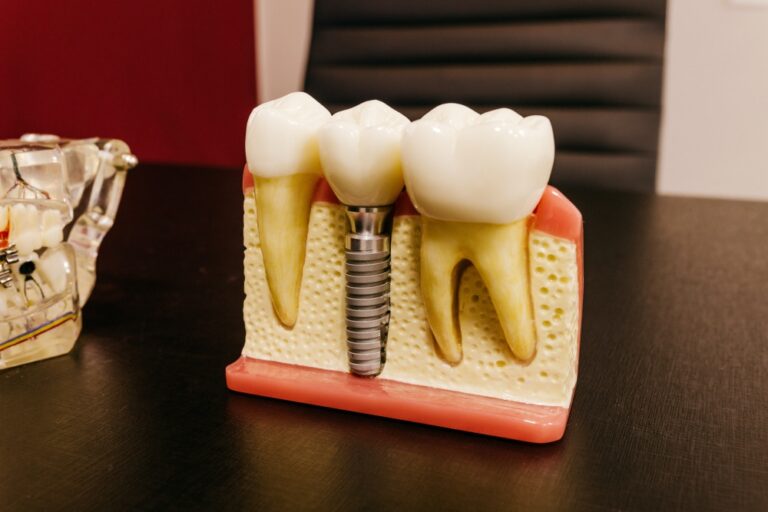Braces care helps you keep your mouth healthy while you straighten your teeth.
Wearing braces can help you achieve the perfect smile you’ve always dreamed of. Whether your dentist recommends traditional metal braces or the newer invisible orthodontic devices, each works in a similar way by gently forcing your teeth into alignment over an extended period of time. As your teeth slowly shift, the bones beneath them shift as well, and in no time, your teeth are straight and aligned, just as they should be.
Of course, it’s not exactly a walk in the park: One of the biggest downfalls of having braces is the extra care required to take good care of your teeth until the braces come off. Braces make brushing and flossing your teeth much more difficult, and the tiny nooks and crannies that braces create are the perfect hiding spots for food particles and bacteria. If you don’t modify your dental hygiene practices while wearing braces, you could end up with a straight smile that’s filled with cavities and periodontal disease.
The hazards of periodontal disease
Braces put you at a greater risk of developing periodontal disease, which is why good oral hygiene is imperative. Periodontal disease develops when infections in the teeth and gums lead to inflammation, resulting in a whole host of problems throughout your entire body. The infection from your mouth can infiltrate your bloodstream, leading to other health conditions such as stroke, heart disease, diabetes, osteoporosis, respiratory disease and much, much more.
To prevent periodontal disease and other oral health problems while you have braces, you should:
- Clean your teeth more often.
Braces can make cleaning your teeth a tricky process. Food particles and bacteria can build up around them, so you need to take special care to ensure that you keep your mouth clean at all times. If possible, clean the surfaces of your teeth and floss between them after every meal. If you can’t brush after eating, swish thoroughly with water to remove any leftover debris.
You also want to ensure that you clean your teeth first thing in the morning and before going to bed. This will prevent plaque buildup and will help keep your teeth free of cavities and other oral health issues.
- Use fluoride regularly.
Fluoride helps build up the enamel of your teeth and protects them from decay. Getting regular fluoride treatments from your dentist, as well as using a toothpaste fortified with fluoride, will give your teeth an extra level of protection, especially while you have braces.
- Never miss a checkup.
Regular dental visits are always important, but they become even more crucial when you have braces. Not only will your dentist or orthodontist be able to determine how well your teeth are responding to the device(s), they will also be able to make sure you don’t have any latent oral health issues developing in your mouth. They’ll be able to check for cavities and gum disease and will make sure there isn’t any excessive plaque buildup on your teeth.
- Watch what you eat.
Your diet plays an essential role in your oral health because eating wholesome foods filled with vitamins and minerals helps keep your teeth healthy and strong. When you have braces, it becomes even more important to pay attention to the foods you eat. While certain foods may be healthy for your body, they may also pose a risk to your braces. Hard foods such as nuts, candies and ice could cause damage to the brackets and wires of your braces. Sticky foods like chewing gum, taffy and beef jerky may loosen the wires, and acidic or sugary drinks could stain your teeth or wear away the enamel. Be judicious about what you eat with braces.
- Use orthodontic cleaning tools.
Keeping your teeth clean with a regular toothbrush may prove more difficult with braces. Fortunately, there is a wide variety of tools available that can help keep your teeth clean, even in the hardest-to-reach areas. Proxy brushes, floss threaders, dental picks and water flossers can help get in between and behind brackets and wires to help you keep your teeth clean and free from food particles and debris.
- Replace your toothbrush regularly.
When you have braces, your toothbrush can take a beating. Brackets and wires can wreak havoc on your brush’s bristles, causing them to wear down and even fall out. Replacing your brush at regular monthly intervals will help make sure the brush you’re using is in the proper condition required to keep your teeth clean and your mouth healthy.
Wearing braces is an excellent way to get the smile you’ve always dreamed of, but it also means that your teeth and gums need extra care to stay healthy and disease-free. By following these helpful tips, you can make sure you get the best benefits from your braces and keep periodontal disease at bay.
Your oral health plays an essential role in the wellbeing of your entire body. The Dental Medical Convergence creates a partnership between dentists and family physicians to advocate for the importance of oral health. By supporting this cause, you are lending your voice toward creating a stronger and more educated relationship between doctors and dentists. Not only will this enhance our general knowledge of the body as a whole, but it will also help millions of people around the world gain better health and more advanced oral hygiene. For more information or to support this worthwhile cause, contact The Dental Medical Convergence today at AMA@TheDentalMedicalConvergence.org. Learn More at The Dental Medical Convergence





